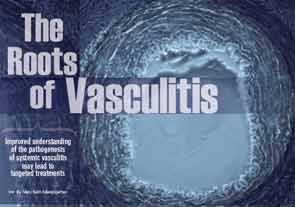
SAN DIEGO—Over the past few years, a better understanding of the pathogenesis of small- and large-vessel vasculitis has emerged from a clearer picture of the role of the adaptive and innate immune system on disease development, as well a better understanding of the genetic and environmental elements that create conditions conducive for disease development.
Recent advances in the pathogenesis of small- and large-vessel vasculitis were the focus of a session at the 2013 ACR/ARHP Annual Meeting during a session titled, “Novel Insight Into the Pathogenesis of Systemic Vasculitis.” [Editor’s Note: This session was recorded and is available via ACR SessionSelect at www.rheumatology.org.]
New Disease Model
Cornelia M. Weyand, MD, PhD, chief of the division of immunology and rheumatology and professor of medicine at Stanford School of Medicine in Stanford, Calif., focused on giant-cell arteritis (GCA) when presenting a new disease model of large-vessel vasculitis that includes two different pathways involved in the pathogenesis of disease. Chronic inflammation ends up as a “cytokine soup,” she said, but emphasized the importance of identifying the initial event that caused the inflammation to potentially better target treatment.
Although Dr. Weyand said that multiple gaps in knowledge still exist in understanding this pathogenesis, a major clue to a better understanding is the fact that age is the strongest risk factor. She reviewed the aging immune system, focusing on two pathways of pathogenesis of GCA based on clusters of cytokines found in the tissue lesions of patients with GCA: 1) a cluster of interleukin (IL) 12, interferon (INF) gamma, and IL-2; and 2) a cluster of IL-6 and IL-17. Based on this finding, she said a new disease model of large vessel vasculitis proposes that there are two disease-relevant T-cell lineages driving vasculitis: IL-17–producing Th17 cells and INF gamma–producing TH1 cells.
Of these two T-cell lineages, the INF gamma–producing cells (Th1) comprise 20%–30% of the cells in the blood of patients with GCA. This is 10 times as many cells as the Th17, which only comprise 2%–3% of cells. “The Th17 pathway may help light the fire,” Dr. Weyand said, “but does very little in maintaining disease over time.”
The importance of this for treatment is highlighted by the fact that IL 17–producing cells (Th17) are affected by corticosteroid treatment, but that INF gamma–producing cells (Th1) are not.
Summarizing her findings, Dr. Weyand described this new disease model as the triple-hit model:
- The vascular wall plays a role by sending and receiving signals.
- The cytokines IL-6 and IL-17 drive an immune pathway that is easily controlled by corticosteroid therapy and is possibly dispensable for vasculitis.
- The cytokines IL-12 and INF gamma drive an immune pathway that is indispensible for vasculitis and relatively resistant to steroids.
Rula A. Hajj-Ali, MD, a physician in the department of rheumatic and immunologic diseases at the Cleveland Clinic in Cleveland, Ohio, who moderated the session, emphasized that one of the challenges remaining is how to meet the diversity of pathogenesis with multiple therapies, but without overtreatment.
